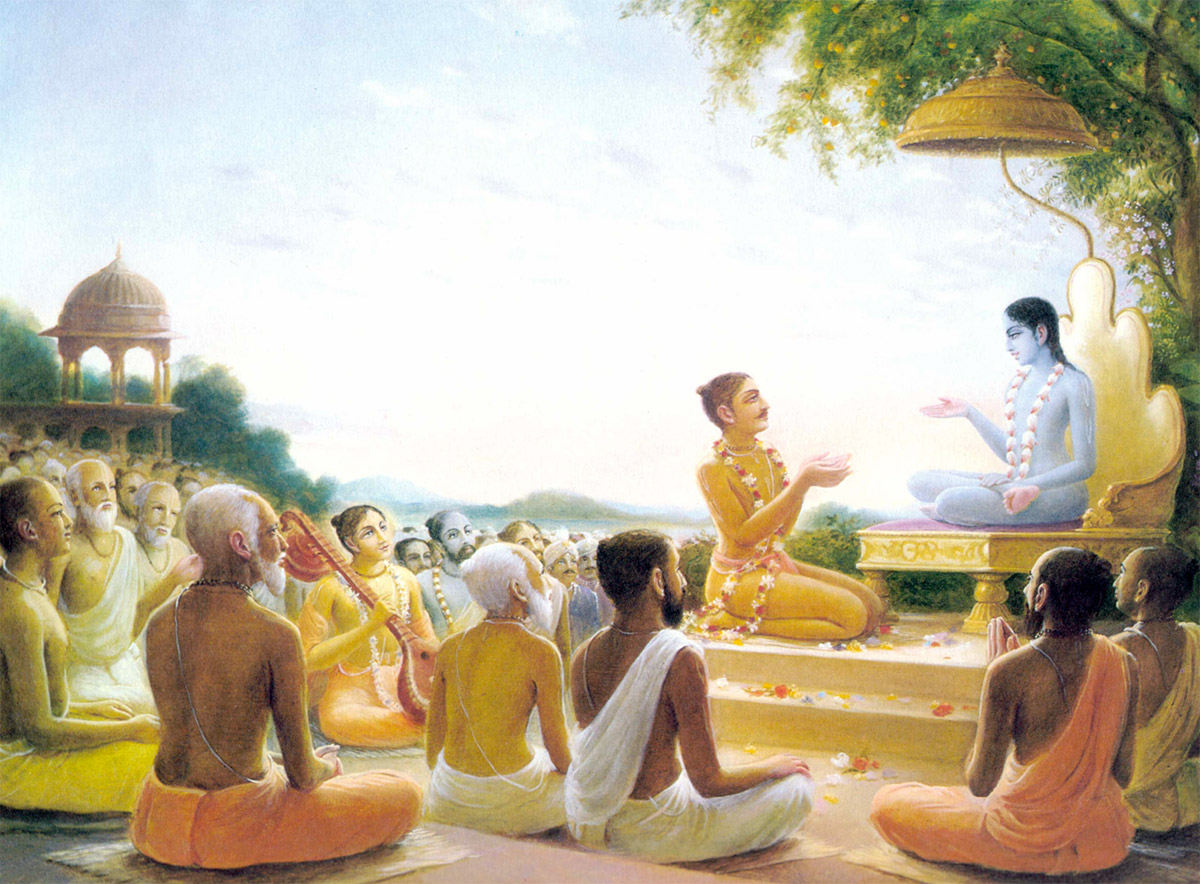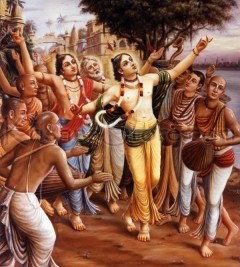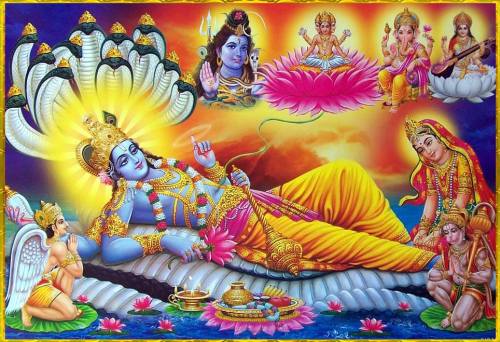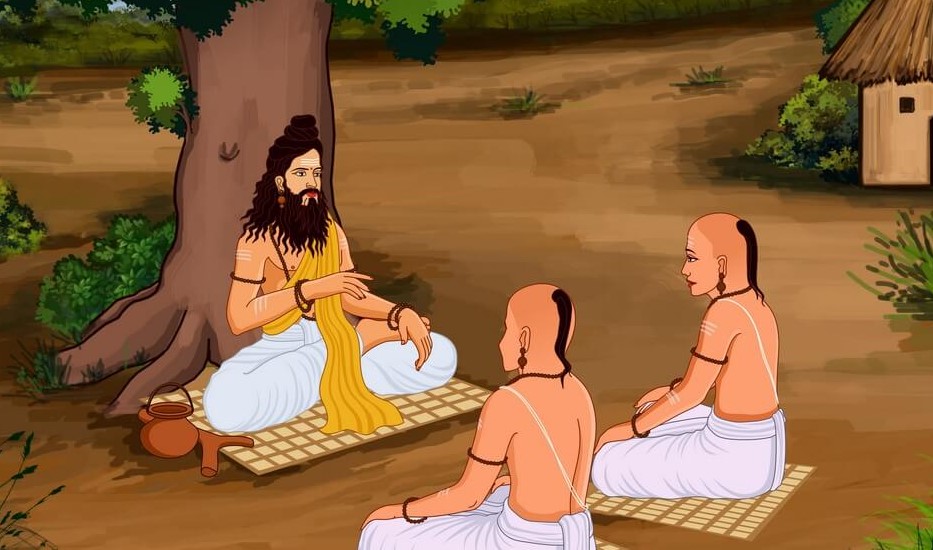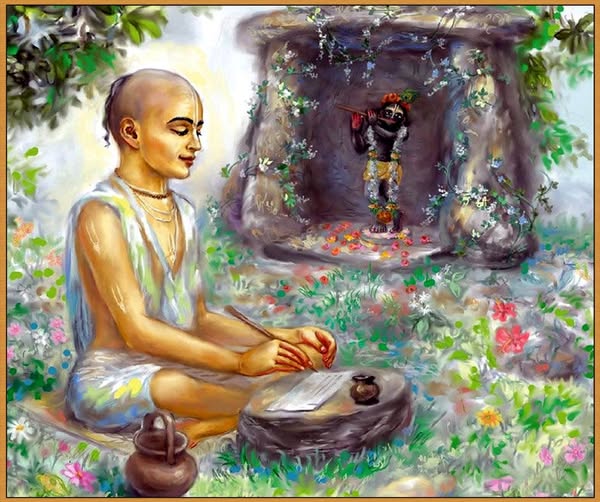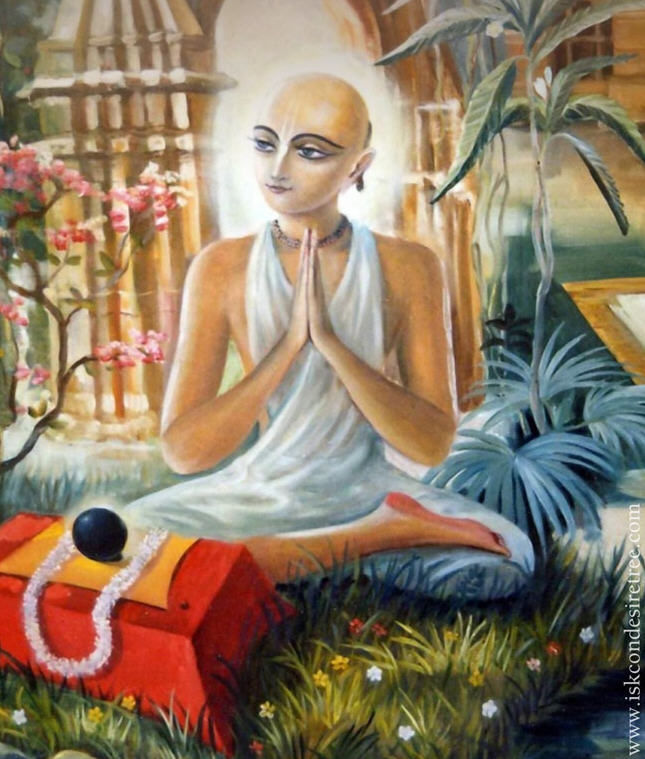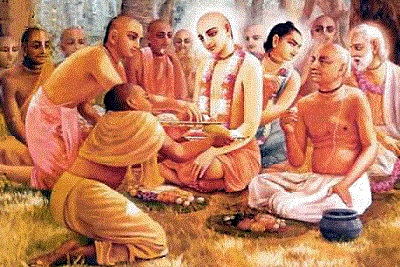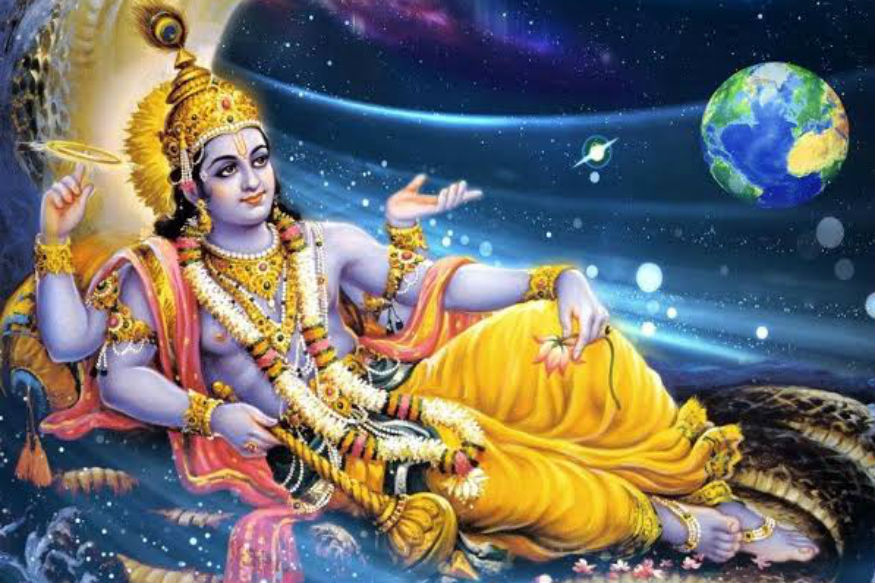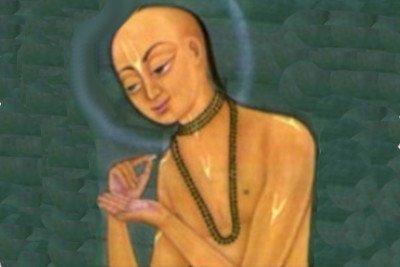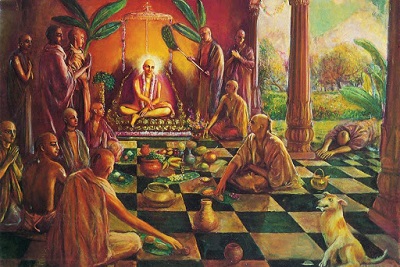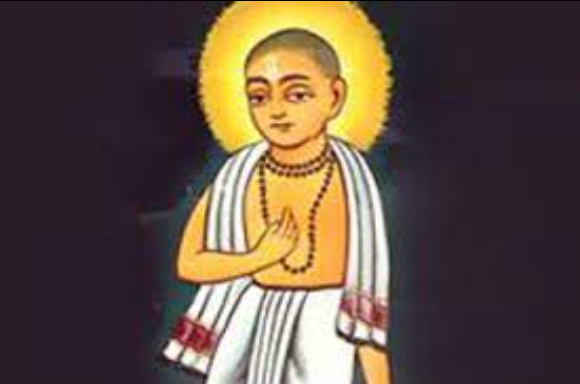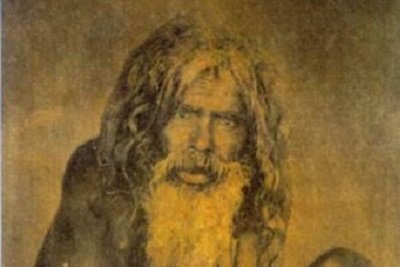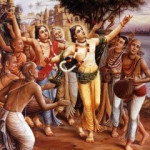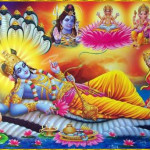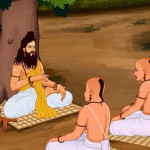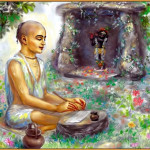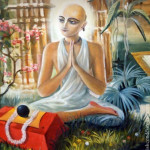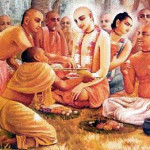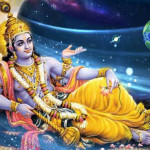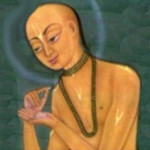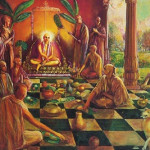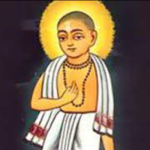Śrīmad-Bhāgvatam – Canto 9
(Q&A Format)
According to the Vedic law, there is no such thing as divorce.
However great a woman may be, she must be ready to carry out her husband’s orders and please him in all circumstances. Then her life will be successful. When the wife becomes as irritable as the husband, their life at home is sure to be disturbed or ultimately completely broken. In the modern day, the wife is never submissive, and therefore home life is broken even by slight incidents. Either the wife or the husband may take advantage of the divorce laws. According to the Vedic law, however, there is no such thing as divorce laws, and a woman must be trained to be submissive to the will of her husband. Westerners contend that this is a slave mentality for the wife, but factually it is not; it is the tactic by which a woman can conquer the heart of her husband, however irritable or cruel he may be.
Source: A.C. Bhaktivedanta Swami Prabhupada (2014 edition), “Srimad Bhagavatam”, Ninth Canto, Chapter 3 – Text 10
Modern medical science has not yet discovered how to bring a dead body back to life.
The heavenly physicians like the Asvini-kumaras could give youthful life even to one who was advanced in age. Indeed, great yogis, with their mystic powers, can even bring a dead body back to life if the structure of the body is in order. We have already discussed this in connection with Bali Maharaja’s soldiers and their treatment by Sukracarya. Modern medical science has not yet discovered how to bring a dead body back to life or bring youthful energy to an old body, but from these verses we can understand that such treatment is possible if one is able to take knowledge from the Vedic information. The Asvinikumaras were expert in Ayur-veda, as was Dhanvantari. In every department of material science, there is a perfection to be achieved, and to achieve it one must consult the Vedic literature. The highest perfection is to become a devotee of the Lord. To attain this perfection, one must consult Srimad-Bhagavatam, which is understood to be the ripe fruit of the Vedic desire tree (nigama-kalpa-taror galitam phalam).
Source: A.C. Bhaktivedanta Swami Prabhupada (2014 edition), “Srimad Bhagavatam”, Ninth Canto, Chapter 3 – Text 11
After initiation, a disciple should be extremely careful not to commit any sinful act.
Sometimes the spiritual master, after accepting a disciple, must take charge of that disciple’s past sinful activities and, being overloaded, must sometimes suffer–if not fully, then partially– for the sinful acts of the disciple. To counteract the sinful reactions he accepts from the disciple, he has to see a bad dream. Nonetheless, the spiritual master is so kind that in spite of having bad dreams due to the sinful disciple, he accepts this troublesome business for the deliverance of the victims of Kali-yuga. After initiation, therefore, a disciple should be extremely careful not to commit again any sinful act that might cause difficulties for himself and the spiritual master. Before the Deity, before the fire, before the spiritual master and before the Vaisnavas, the honest disciple promises to refrain from all sinful activity. Therefore he must not again commit sinful acts and thus create a troublesome situation. The poor spiritual master is kind and merciful enough to accept a disciple and partially suffer for that disciple’s sinful activities, but Krishna, being merciful to His servant, neutralizes the reactions of sinful deeds for the servant who engages in preaching His glories.
Source: A.C. Bhaktivedanta Swami Prabhupada (2014 edition), “Srimad Bhagavatam”, Eighth Canto, Chapter 4 – Text 15
A.C. Bhaktivedanta Swami Prabhupada (2014 edition), “Srimad Bhagavatam”, Ninth Canto, Chapter 9 – Text 5
Sankirtana-yajna is the sacrifice recommended in scriptures (shastra) for kaliyuga.
When one performs ritualistic sacrifices as prescribed in the Vedas, one needs expert brahmanas known as yajnika-brahmanas. In Kali-yuga, however, there is a scarcity of such brahmanas. Therefore in Kaliyuga the sacrifice recommended in shastra is sankirtana-yajna (yajnaih sankirtana-prayair yajanti hi sumedhasah). Instead of spending money unnecessarily on performing yajnas impossible to perform in this age of Kali because of the scarcity of yajnika-brahmanas, one who is intelligent performs sankirtana-yajna. Without properly performed yajnas to satisfy the Supreme Personality of Godhead, there will be scarcity of rain (yajnad bhavati parjanyah). Therefore the performance of yajna is essential.
Source: A.C. Bhaktivedanta Swami Prabhupada (2014 edition), “Srimad Bhagavatam”, Ninth Canto, Chapter 4 – Text 22
Nothing connected with the Supreme Personality of Godhead is material.
For those who are materially engaged, control of the senses is required, but a devotee’s senses are all engaged in the service of the Lord, which means that they are already controlled. param drstva nivartate (Bg. 2.59). A devotee’s senses are not attracted by material enjoyment. And even though the material world is full of misery, the devotee considers this material world to be also spiritual because everything is engaged in the service of the Lord. The difference between the spiritual world and material world is the mentality of service. Nirbandhah krsna-sambandhe yuktam vairagyam ucyate. When there is no mentality of service to the Supreme personality of Godhead, one’s activities are material.
prapanci-kataya buddhya hari-sambandhi-vastunah
mumuksubhih parityago vairagyam phalgu kathyate
(Bhakti-rasamrta-sindhu 1.2.256)
That which is engaged in the service of the Lord is not material, and nothing thus engaged should be given up. In the construction of a high skyscraper and the construction of a temple, there may be the same enthusiasm, but the endeavors are different, for one is material and the other spiritual. Spiritual activities should not be confused with material activities and given up. Nothing connected with Hari, the Supreme Personality of Godhead, is material. A devotee who considers all this is always situated in spiritual activities, and therefore he is no longer attracted by material activities (param drstva nivartate).
Source: A.C. Bhaktivedanta Swami Prabhupada (2014 edition), “Srimad Bhagavatam”, Ninth Canto, Chapter 4 – Text 25
The pure devotee is always engaged in increasing the transcendental happiness of the lord.
The Supreme Personality of Godhead is self-sufficient, but to enjoy His transcendental bliss He requires the cooperation of His devotees. In Vrindavana, for example, although Lord Krishna is full in Himself, He wants the cooperation of His devotees like the cowherd boys and the gopis to increase His transcendental bliss. Such pure devotees, who can increase the pleasure potency of the Supreme personality of Godhead, are certainly most dear to Him. Not only does the Supreme Personality of Godhead enjoy the company of His devotees, but because He is unlimited He wants to increase His devotees unlimitedly. Thus, He descends to the material world to induce the nondevotees and rebellious living entities to return home, back to Godhead. He requests them to surrender unto Him because, unlimited as He is, He wants to increase His devotees unlimitedly. The Krishna consciousness movement is an attempt to increase the number of pure devotees of the Supreme Lord more and more. It is certain that a devotee who helps in this endeavor to satisfy the Supreme Personality of Godhead becomes indirectly a controller of the Supreme Lord. Although the Supreme Lord is full in six opulences, He does not feel transcendental bliss without His devotees. An example that may be cited in this regard is that if a very rich man does not have sons in a family he does not feel happiness. Indeed, sometimes a rich man adopts a son to complete his happiness. The science of transcendental bliss is known to the pure devotee. Therefore the pure devotee is always engaged in increasing the transcendental happiness of the Lord.
Source: A.C. Bhaktivedanta Swami Prabhupada (2014 edition), “Srimad Bhagavatam”, Ninth Canto, Chapter 4 – Text 64
Misuse of power is ultimately dangerous not for society but for the person who misuses it.
A Vaisnava is always an object of envy for nondevotees, even when the nondevotee happens to be his father. To give a practical example, Hiranyakasipu was envious of Prahlada Maharaja, but this envy of the devotee was harmful to Hiranyakasipu, not to Prahlada. Every action taken by Hiranyakasipu against his son Prahlada Maharaja was taken very seriously by the Supreme Personality of Godhead, and thus when Hiranyakasipu was on the verge of killing Prahlada, the Lord personally appeared and killed Hiranyakasipu. One’s so-called prowess, when employed against the devotee, certainly harms he who employs it. Thus it is the subject, not the object, who is harmed.
It is said that a jewel is very valuable, but when it is on the hood of a serpent, it is dangerous despite its value. Similarly, when a materialistic nondevotee achieves great success in learning and austerity, that success is dangerous for all of society. So-called learned scientists, for example, invented atomic weapons that are dangerous for all humanity. It is therefore said, manina bhusitah sarpah kim asau na bhayankarah. A serpent with a jewel on its hood is as dangerous as a serpent without such a jewel. Durvasa Muni was a very learned brahmana equipped with mystic power, but because he was not a gentleman, he did not know how to use his power. He was therefore extremely dangerous. The Supreme Personality of Godhead is never inclined toward a dangerous person who uses his mystic power for some personal design. By the laws of nature, therefore, such misuse of power is ultimately dangerous not for society but for the person who misuses it.
Source: A.C. Bhaktivedanta Swami Prabhupada (2014 edition), “Srimad Bhagavatam”, Ninth Canto, Chapter 4 – Text 69 & 70
What is Sudarshna Chakra?
The word Sudarshana means “auspicious vision”. The Sudarshana cakra is the glance of the Supreme Personality of Godhead by which He creates the entire material world. Sa aiksata, sa asrjata. This is the Vedic version. The Sudarshana cakra, which is the origin of creation and is most dear to the Lord, has thousands of spokes. This Sudarshana cakra is the killer of the prowess of all other weapons, the killer of darkness, and the manifester of the prowess of devotional service; it is the means of establishing religious principles, and it is the killer of all irreligious activities. Without his mercy, the universe cannot be maintained, and therefore the Sudarshana cakra is employed by the Supreme personality of Godhead.
Source: A.C. Bhaktivedanta Swami Prabhupada (2014 edition), “Srimad Bhagavatam”, Ninth Canto, Chapter 5 – Text 5 & Introduction
Lord’s glance is the original cause of material creation.
From Vedic instructions we understand that this material world is created by the glance of the Supreme personality of Godhead (sa aiksata, sa asrjata). The Supreme personality of Godhead glanced over the mahat-tattva, or the total material energy, and when it was agitated, everything came into existence. Western philosophers sometimes think that the original cause of creation was a chunk that exploded. If one thinks of this chunk as the total material energy, the mahat-tattva, one can understand that the chunk was agitated by the glance of the Lord, and thus the Lord’s glance is the original cause of material creation.
Source: A.C. Bhaktivedanta Swami Prabhupada (2014 edition), “Srimad Bhagavatam”, Ninth Canto, Chapter 5 – Text 5
The western countries have reached the summit of material civilization.
Material desire is just like a blazing fire. If a fire is continually supplied with drops of fat, the fire will increase more and more and never be extinguished. Therefore the policy of trying to satisfy material desires by catering to one’s material demands will never be successful. In modern civilization, everyone is engaged in economic development, which is another way of constantly dropping fat into the material fire. The Western countries have reached the summit of material civilization, but people are still dissatisfied. Real satisfaction is Krishna consciousness. This is confirmed in Bhagavad-gita (5.29), where Krishna says:
bhoktaram yajna-tapasam sarva-loka-mahesvaram
suhrdam sarva-bhutanam jnatva mam santim rcchati
“The sages, knowing Me as the ultimate purpose of all sacrifices and austerities, the Supreme Lord of all planets and demigods and the benefactor and well-wisher of all living entities, attain peace from the pangs of material miseries.” One must therefore take to Krishna consciousness and advance in Krishna consciousness by properly following the regulative principles. Then one can attain an eternal, blissful life in peace and knowledge.
Source: A.C. Bhaktivedanta Swami Prabhupada (2014 edition), “Srimad Bhagavatam”, Ninth Canto, Chapter 6 – Text 48
A secluded place is also not secure unless there is good association.
Saubhari Muni, giving conclusions derived from his practical experience, instructs us that persons interested in crossing to the other side of the material ocean must give up the association of persons interested in sex life and accumulating money. This is also advised by Sri Caitanya Mahaprabhu:
niskincanasya bhagavad-bhajanonmukasya param param jigamisor bhava-sagarasya
sandarsanam visayinam atha yositam ca ha hanta hanta visa-bhaksanato ‘py asadhu
(Caitanya-candrodaya-nataka 8.27)
“Alas, for a person seriously desiring to cross the material ocean and engage in the transcendental loving service of the Lord without material motives, seeing a materialist engaged in sense gratification and seeing a woman who is similarly interested is more abominable than drinking poison willingly.” One who desires complete freedom from material bondage can engage himself in the transcendental loving service of the Lord. He must not associate with visayi—materialistic persons or those interested in sex life. Every materialist is interested in sex. Thus in plain language it is advised that an exalted saintly person avoid the association of those who are materially inclined. Saubhari Muni regrets that he had bad association even in the deepest part of the water. Because of the bad association of the sexually engaged fish, he fell down. A secluded place is also not secure unless there is good association.
Source: A.C. Bhaktivedanta Swami Prabhupada (2014 edition), “Srimad Bhagavatam”, Ninth Canto, Chapter 6 – Text 51
The subtle body ends if there is no material desire at the time of death.
At the time of death, fire burns the gross body, and if there is no more desire for material enjoyment the subtle body is also ended, and in this way a pure soul remains. This is confirmed in Bhagavad-gita (tyaktva deham punar janma naiti). If one is free from the bondage of both the gross and subtle material bodies and remains a pure soul, he returns home, back to Godhead, to be engaged in the service of the Lord. Tyaktva deham punar janma naiti mam eti: he goes back home, back to Godhead.
Source: A.C. Bhaktivedanta Swami Prabhupada (2014 edition), “Srimad Bhagavatam”, Ninth Canto, Chapter 6 – Text 54
Woman will automatically get the opportunity to enter the spiritual world, if her husband is spiritually advanced.
As stated in Bhagavad-gita (9.32), striyo vaisyas tatha sudras te ‘pi yanti param gatim. Women are not considered very powerful in following spiritual principles, but if a woman is fortunate enough to get a suitable husband who is spiritually advanced and if she always engages in his service, she also gets the same benefit as her husband. Here it is clearly said that the wives of Saubhari Muni also entered the spiritual world by the influence of their husband. They were unfit, but because they were faithful followers of their husband, they also entered the spiritual world with him. Thus a woman should be a faithful servant of her husband, and if the husband is spiritually advanced, the woman will automatically get the opportunity to enter the spiritual world.
Source: A.C. Bhaktivedanta Swami Prabhupada (2014 edition), “Srimad Bhagavatam”, Ninth Canto, Chapter 6 – Text 55
Why it is recommended to bath in the Ganges?
It has actually been seen that anyone who regularly worships mother Ganges simply by bathing in her water keeps very good health and gradually becomes a devotee of the Lord. This is the effect of bathing in the water of the Ganges. Bathing in the Ganges is recommended in all Vedic shastras, and one who takes to this path will certainly be completely freed from all sinful reactions. The practical example of this is that the sons of Maharaja Sagara went to the heavenly planets when water from the Ganges merely touched the ashes of their burnt bodies.
Source: A.C. Bhaktivedanta Swami Prabhupada (2014 edition), “Srimad Bhagavatam”, Ninth Canto, Chapter 9 – Text 14
Destroying the undeveloped embryo of the soul in the womb is sinful.
As stated in the Amara-kosa dictionary, bhruno’rbhake bala-garbhe: the word bhruna refers either to the cow or to the living entity in embryo. According to Vedic culture, destroying the undeveloped embryo of the soul in the womb is as sinful as killing a cow or a brahmana. In the embryo, the living entity is present in an undeveloped stage. The modern scientific theory that life is a combination of chemicals is nonsense; scientists cannot manufacture living beings, even like those born from eggs. The idea that scientists can develop a chemical situation resembling that of an egg and bring life from it is nonsensical. Their theory that a chemical combination can have life may be accepted, but these rascals cannot create such a combination. This verse refers to bhrunasya vadham–the killing of a bhruna or destruction of the embryo. Here is a challenge from the Vedic literature. The crude, atheistic understanding that the living entity is a combination of matter belongs to the grossest ignorance.
Source: A.C. Bhaktivedanta Swami Prabhupada (2014 edition), “Srimad Bhagavatam”, Ninth Canto, Chapter 9 – Text 31
Lord Ramchandra, as an ideal king, accepted only one wife.
Eka-patni-vrata, accepting only one wife, was the glorious example set by Lord Ramacandra. One should not accept more than one wife. In those days, of course, people did marry more than one wife. Even Lord Ramacandra’s father accepted more wives than one. But Lord Ramacandra, as an ideal king, accepted only one wife, mother Sita. When mother Sita was kidnapped by Ravana and the Raksasas, Lord Ramacandra, as the Supreme Personality of Godhead, could have married hundreds and thousands of Sitas, but to teach us how faithful He was to His wife, He fought with Ravana and finally killed him. The Lord punished Ravana and rescued His wife to instruct men to have only one wife. Lord Ramacandra accepted only one wife and manifested sublime character, thus setting an example for householders. A householder should live according to the ideal of Lord Ramacandra, who showed how to be a perfect person. Being a householder or living with a wife and children is never condemned, provided one lives according to the regulative principles of varnasrama-dharma. Those who live in accordance with these principles, whether as householders, brahmacaris or vanaprasthas, are all equally important.
Source: A.C. Bhaktivedanta Swami Prabhupada (2014 edition), “Srimad Bhagavatam”, Ninth Canto, Chapter 10 – Text 54
Vedic civilization prefers monarchy.
If the government is unsteady and unregulated, there is danger of fear for the people. At the present moment this danger always exists because of government by the people. In the so-called people’s government there is no trained ksatriya king; as soon as someone strong accumulates votes, he becomes the minister or president, without training from the learned brahmanas expert in the shastras. Indeed, we see that in some countries the government changes from party to party, and therefore the men in charge of the government are more eager to protect their position than to see that the citizens are happy. The Vedic civilization prefers monarchy. People liked the government of Lord Ramacandra, the government of Maharaja Yudhisthira and the governments of Maharaja Pariksit, Maharaja Ambarisa and Maharaja Prahlada. There are many instances of excellent government under a monarch. Gradually the democratic government is becoming unfit for the needs of the people, and therefore some parties are trying to elect a dictator. A dictatorship is the same as a monarchy, but without a trained leader. Actually people will be happy when a trained leader, whether a monarch or a dictator, takes control of the government and rules the people according to the standard regulations of the authorized scriptures.
Source: A.C. Bhaktivedanta Swami Prabhupada (2014 edition), “Srimad Bhagavatam”, Ninth Canto, Chapter 13 – Text 12
Never place your faith in a woman or a politician.
“Cāṇakya Paṇḍita has advised, viśvāso naiva kartavyaḥ strīṣu rāja-kuleṣu ca: “Never place your faith in a woman or a politician.” Unless elevated to spiritual consciousness, everyone is conditioned and fallen, what to speak of women, who are less intelligent than men. Women have been compared to śūdras and vaiśyas (striyo vaiśyās tathā śūdrāḥ). On the spiritual platform, however, when one is elevated to the platform of Kṛṣṇa consciousness, whether one is a man, woman, śūdra or whatever, everyone is equal. Otherwise, Urvaśī, who was a woman herself and who knew the nature of women, said that a woman’s heart is like that of a sly fox. If a man cannot control his senses, he becomes a victim of such sly foxes. But if one can control the senses, there is no chance of his being victimized by sly, foxlike women. Cāṇakya Paṇḍita has also advised that if one has a wife like a sly fox, he must immediately give up his life at home and go to the forest.
mātā yasya gṛhe nāsti bhāryā cāpriya-vādinī
araṇyaṁ tena gantavyaṁ yathāraṇyaṁ tathā gṛham (Cāṇakya-śloka 57)
Kṛṣṇa conscious gṛhasthas must be very careful of the sly fox woman. If the wife at home is obedient and follows her husband in Kṛṣṇa consciousness, the home is welcome. Otherwise one should give up one’s home and go to the forest.
hitvātma-pātaṁ gṛham andha-kūpaṁ
vanaṁ gato yad dharim āśrayeta (Bhāg. 7.5.5)
One should go to the forest and take shelter of the lotus feet of Hari, the Supreme Personality of Godhead.”
Source:A.C. Bhaktivedanta Swami Prabhupada (2014 edition), “Srimad Bhagavatam”, Ninth Canto, Chapter 14 – Text 36
In satya-yuga there was only one Veda and the only mantra was Omkara.
In Satya-yuga there was only one Veda, not four. Later, before the beginning of Kali-yuga, this one Veda, the Atharva Veda (or, some say, the Yajur Veda), was divided into four — Sāma, Yajur, Ṛg and Atharva — for the facility of human society. In Satya-yuga the only mantra was oṁkāra (oṁ tat sat). The same name oṁkāra is manifest in the mantra Hare Kṛṣṇa, Hare Kṛṣṇa, Kṛṣṇa Kṛṣṇa, Hare Hare/ Hare Rāma, Hare Rāma, Rāma Rāma, Hare Hare. Unless one is a brāhmaṇa, one cannot utter oṁkāra and get the desired result. But in Kali-yuga almost everyone is a śūdra, unfit for pronouncing the praṇava, oṁkāra. Therefore the śāstras have recommended the chanting of the Hare Kṛṣṇa mahā-mantra. Oṁkāra is a mantra, or mahā-mantra, and Hare Kṛṣṇa is also a mahā-mantra. The purpose of pronouncing oṁkāra is to address the Supreme Personality of Godhead, Vāsudeva (oṁ namo bhagavate vāsudevāya). And the purpose of chanting the Hare Kṛṣṇa mantra is the same. Hare: “O energy of the Lord!” Kṛṣṇa: “O Lord Kṛṣṇa!” Hare: “O energy of the Lord!” Rāma: “O Supreme Lord, O supreme enjoyer!” The only worshipable Lord is Hari, who is the goal of the Vedas (vedaiś ca sarvair aham eva vedyaḥ). By worshiping the demigods, one worships the different parts of the Lord, just as one might water the branches and twigs of a tree. But worshiping Nārāyaṇa, the all-inclusive Supreme Personality of Godhead, is like pouring water on the root of the tree, thus supplying water to the trunk, branches, twigs, leaves and so on. In Satya-yuga people knew how to fulfill the necessities of life simply by worshiping Nārāyaṇa, the Supreme Personality of Godhead. The same purpose can be served in this Age of Kali by the chanting of the Hare Kṛṣṇa mantra, as recommended in the Bhāgavatam. Kīrtanād eva kṛṣṇasya mukta-saṅgaḥ paraṁ vrajet. Simply by chanting the Hare Kṛṣṇa mantra, one becomes free from the bondage of material existence and thus becomes eligible to return home, back to Godhead.
Source:A.C. Bhaktivedanta Swami Prabhupada (2014 edition), “Srimad Bhagavatam”, Ninth Canto, Chapter 14 – Text 48
What is aksauhini?
The word akṣauhiṇī refers to a military phalanx consisting of 21,870 chariots and elephants, 109,350 infantry soldiers and 65,610 horses. “One chariot, one elephant, five infantry soldiers and three horses are called a patti by those who are learned in the science. The wise also know that a senāmukha is three times what a patti is. Three senāmukhas are known as one gulma, three gulmas are called a gaṇa, and three gaṇas are called a vāhinī. Three vāhinīs have been referred to by the learned as a pṛtanā, three pṛtanās equal one camū, and three camūs equal one anīkinī. The wise refer to ten anīkinīs as one akṣauhiṇī. The chariots of an akṣauhiṇī have been calculated at 21,870 by those who know the science of such calculations, O best of the twice-born, and the number of elephants is the same. The number of infantry soldiers is 109,350, and the number of horses is 65,610. This is called an akṣauhiṇī.”
Source: A.C. Bhaktivedanta Swami Prabhupada (2014 edition), “Srimad Bhagavatam”, Ninth Canto, Chapter 15 – Text 30
The story of he-goat and she-goat.
“After many, many years of sexual relationships and enjoyment in the material world, King Yayāti finally became disgusted with such materialistic happiness. When satiated with material enjoyment, he devised a story of a he-goat and she-goat, corresponding to his own life, and narrated the story before his beloved Devayānī. The story is as follows. Once upon a time, while a goat was searching in a forest for different types of vegetables to eat, by chance he came to a well, in which he saw a she-goat. He became attracted to this she-goat and somehow or other delivered her from the well, and thus they were united. One day thereafter, when the she-goat saw the he-goat enjoying sex with another she-goat, she became angry, abandoned the he-goat, and returned to her brāhmaṇa owner, to whom she described her husband’s behavior. The brāhmaṇa became very angry and cursed the he-goat to lose his sexual power. Thereupon, the he-goat begged the brāhmaṇa’s pardon and was given back the power for sex. Then the he-goat enjoyed sex with the she-goat for many years, but still he was not satisfied. Here Mahārāja Yayāti compares himself to a he-goat and Devayānī to a she-goat and describes the nature of man and woman. Like a he-goat, a man searches for sense gratification, wandering here and there, and a woman without the shelter of a man or husband is like a she-goat that has fallen into a well. Without being cared for by a man, a woman cannot be happy. Indeed, she is just like a she-goat that has fallen into a well and is struggling for existence. Therefore a woman must take shelter of her father, as Devayānī did when under the care of Śukrācārya, and then the father must give the daughter in charity to a suitable man, or a suitable man should help the woman by placing her under the care of a husband. This is shown vividly by the life of Devayānī. When King Yayāti delivered Devayānī from the well, she felt great relief and requested Yayāti to accept her as his wife.
If one is lusty and greedy, even the total stock of gold in this world cannot satisfy one’s lusty desires. These desires are like a fire. One may pour clarified butter on a blazing fire, but one cannot expect the fire to be extinguished. To extinguish such a fire, one must adopt a different process. The śāstra therefore advises that by intelligence one renounce the life of enjoyment. Without great endeavor, those with a poor fund of knowledge cannot give up sense enjoyment, especially in relation to sex, because a beautiful woman bewilders even the most learned man. King Yayāti, however, renounced worldly life and divided his property among his sons. He personally adopted the life of a mendicant, or sannyāsī, giving up all attraction to material enjoyment, and engaged himself fully in devotional service to the Lord. Thus he attained perfection. Later, when his beloved wife, Devayānī, was freed from her mistaken way of life, she also engaged herself in the devotional service of the Lord.”
Source:A.C. Bhaktivedanta Swami Prabhupada (2014 edition), “Srimad Bhagavatam”, Ninth Canto, Chapter 19 – Introduction & Text 3
Who is eligible to live in Vrindavana?
To go to the forest and live there with the animals, meditating upon the Supreme Personality of Godhead, is the only means by which to give up lusty desires. Unless one gives up such desires, one’s mind cannot be freed from material contamination. Therefore, if one is at all interested in being freed from the bondage of repeated birth, death, old age and disease, after a certain age one must go to the forest. Pañcāśordhvaṁ vanaṁ vrajet. After fifty years of age, one should voluntarily give up family life and go to the forest. The best forest is Vṛndāvana, where one need not live with the animals but can associate with the Supreme Personality of Godhead, who never leaves Vṛndāvana. Cultivating Kṛṣṇa consciousness in Vṛndāvana is the best means of being liberated from material bondage, for in Vṛndāvana one can automatically meditate upon Kṛṣṇa. Vṛndāvana has many temples, and in one or more of these temples one may see the form of the Supreme Lord as Rādhā-Kṛṣṇa or Kṛṣṇa-Balarāma and meditate upon this form. As expressed here by the words brahmaṇy adhyāya, one should concentrate one’s mind upon the Supreme Lord, Parabrahman. This Parabrahman is Kṛṣṇa, as confirmed by Arjuna in Bhagavad-gītā (paraṁ brahma paraṁ dhāma pavitraṁ paramaṁ bhavān). Kṛṣṇa and His abode, Vṛndāvana, are not different. Śrī Caitanya Mahāprabhu said, ārādhyo bhagavān vrajeśa-tanayas tad-dhāma vṛndāvanam. Vṛndāvana is as good as Kṛṣṇa. Therefore, if one somehow or other gets the opportunity to live in Vṛndāvana, and if one is not a pretender but simply lives in Vṛndāvana and concentrates his mind upon Kṛṣṇa, one is liberated from material bondage. One’s mind is not purified, however, even in Vṛndāvana, if one is agitated by lusty desires. One should not live in Vṛndāvana and commit offenses, for a life of offenses in Vṛndāvana is no better than the lives of the monkeys and hogs there. Many monkeys and hogs live in Vṛndāvana, and they are concerned with their sexual desires. Men who have gone to Vṛndāvana but who still hanker for sex should immediately leave Vṛndāvana and stop their grievous offenses at the lotus feet of the Lord. There are many misguided men who live in Vṛndāvana to satisfy their sexual desires, but they are certainly no better than the monkeys and hogs. Those who are under the control of māyā, and specifically under the control of lusty desires, are called māyā-mṛga. Indeed, everyone in the conditional stage of material life is a māyā-mṛga. It is said, māyā-mṛgaṁ dayitayepsitam anvadhāvad: Śrī Caitanya Mahāprabhu took sannyāsa to show His causeless mercy to the māyā-mṛgas, the people of this material world, who suffer because of lusty desires. One should follow the principles of Śrī Caitanya Mahāprabhu and always think of Kṛṣṇa in full Kṛṣṇa consciousness. Then one will be eligible to live in Vṛndāvana, and his life will be successful.
Source:A.C. Bhaktivedanta Swami Prabhupada (2014 edition), “Srimad Bhagavatam”, Ninth Canto, Chapter 19 – Text 19
Husband & wife should not separate under any condition.
Because a son delivers his father from punishment in the hell called put, the son is called putra. According to this principle, when there is a disagreement between the father and mother, it is the father, not the mother, who is delivered by the son. But if the wife is faithful and firmly adherent to her husband, when the father is delivered the mother is also delivered. Consequently, there is no such thing as divorce in the Vedic literature. A wife is always trained to be chaste and faithful to her husband, for this helps her achieve deliverance from any abominable material condition. This verse clearly says, putro nayati naradeva yama-kṣayāt: “The son saves his father from the custody of Yamarāja.” It never says, putro nayati mātaram: “The son saves his mother.” The seed-giving father is delivered, not the storekeeper mother. Consequently, husband and wife should not separate under any condition, for if they have a child whom they raise to be a Vaiṣṇava, he can save both the father and mother from the custody of Yamarāja and punishment in hellish life.
Source: A.C. Bhaktivedanta Swami Prabhupada (2014 edition), “Srimad Bhagavatam”, Ninth Canto, Chapter 20 – Text 22


